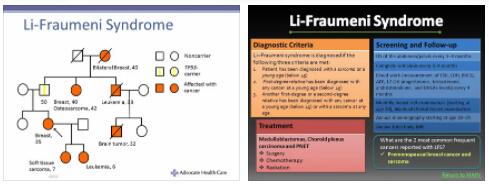Li-Fraumeni syndrome is a hereditary disease that leads to increased tumor formation at a young age. The resulting tumors are mostly malignant and can affect a wide variety of organs and body regions. The disease occurs very rarely.
What is Li-Fraumeni Syndrome?
Li-Fraumeni syndrome is caused by a genetic defect. The so-called autosomes are affected here (the chromosomes that do not belong to the sex chromosomes). See AbbreviationFinder for abbreviations related to Li-Fraumeni Syndrome.
Experts understand Li-Fraumeni syndrome to be a genetic defect that is inherited in an autosomal dominant manner. In those affected, malignant tumors often form as early as childhood or during puberty.
These can affect different parts of the body. However, tumors of the adrenal glands, breast cancer, bone cancer and leukemia are particularly common in connection with the Li-Fraumeni syndrome. The cancer risk of a person with Li-Fraumeni syndrome is significantly increased:
While healthy people under the age of 30 statistically only have a 1% risk of developing cancer, the probability with the genetic defect is 50%. The disease occurs very rarely.
Causes
Li-Fraumeni syndrome is caused by a genetic defect. The so-called autosomes are affected here (the chromosomes that do not belong to the sex chromosomes).
In 70% of all cases of Li-Fraumeni syndrome, there is a mutation in the TP53 gene, which is of crucial importance for tumor suppression (i.e. for preventing tumor growth). As a result, increased tumor formation occurs. If there is no detectable mutation in the gene, the disease can also develop as a result of a disruption in signal transmission as part of tumor suppression.
Most patients with Li-Fraumeni syndrome come from families with a history of the disease. On the other hand, almost a quarter of those affected contract the disease due to a spontaneous gene mutation.
Symptoms, Ailments & Signs
Depending on the body region in which the tumor is located, Li-Fraumeni syndrome can cause very different symptoms and symptoms. If the adrenal glands are affected, hormone disorders can occur, which can manifest themselves in the form of high blood pressure, muscle cramps, external changes and depression, among other things. In the case of blood pressure, palpable metastases form, which can also cause hormonal disorders.
Bone cancer can present with pain, restricted movement, and swelling. The severe course is also typical of such a cartilage sarcoma – more than 50 percent of those affected die within the next five years. Tumors of the central nervous system also have a poor prognosis. They manifest themselves as paralysis, loss of function, nerve pain and a number of other symptoms and complaints.
Leukemia can be recognized externally and, as the disease progresses, causes symptoms such as nausea and vomiting, exhaustion and limited physical and mental performance. So, the symptoms of Li-Fraumeni syndrome can affect the entire body and cause a variety of health problems. The tumor usually arises at a young age and develops rapidly. These are predominantly malignant tumors that take a severe course and are fatal in many cases.
Diagnosis & History
The presence of a Li-Fraumeni syndrome can be determined in many cases (approx. 70%) based on a detectable mutation of the TP53 gene. If such a change is present, the existence of the disease is practically proven.
However, the remaining 30% of those affected do not show any visible genetic changes. Here, the diagnosis is based on the so-called clinical appearance. Anyone who develops sarcoma before the age of 45 and has at least one first- or second-degree relative who had cancer or sarcoma in general before the age of 45 has a high probability of suffering from Li-Fraumeni syndrome. Since the disease brings with it malignant tumor formation, it is generally classified as life-threatening in the course of its course.
Complications
Due to the Li-Fraumeni syndrome, malignant tumors develop. These can lead to the death of the patient in the long term. In most cases, these tumors form in the early years of the patient. However, the further course of the disease depends heavily on the organs affected, so that a general course of this disease cannot usually be predicted.
In general, this leads to fatigue and reduced resilience of the person concerned. Patients can also suffer from pain or various deformities and limitations in everyday life. The quality of life of the affected person is significantly reduced due to the Li-Fraumeni syndrome. Parents and relatives also suffer greatly from the symptoms of this syndrome and can therefore develop psychological problems and depression.
The earlier the tumors are detected, the better they can be removed and treated. However, complete healing cannot be guaranteed. In some cases, the symptoms of Li-Fraumeni syndrome lead to the death of the person affected or to a significant reduction in life expectancy. Some symptoms can be reduced with the help of chemotherapy. However, the therapy itself is associated with various side effects.
When should you go to the doctor?
The Li-Fraumeni syndrome initially manifests itself through general symptoms such as exhaustion, weight loss and malaise. These symptoms usually indicate a serious condition, especially if they occur over a longer period of time, and must therefore be clarified by a doctor. Affected people should inform their family doctor as soon as possible if pain or even skin changes appear. Swelling or nodules are clear warning signs and are best checked right away.
The risk groups include cancer patients and people in whose close relatives there are cases of the rare syndrome or another cancer. The disease occurs before the age of 45, usually in childhood and adolescence, and progresses progressively. Li-Fraumeni syndrome is treated by the general practitioner or a dermatologist. Serious illnesses may need to be treated in a specialist clinic. Basically, the hereditary disease is a serious condition that requires close monitoring by a specialist. There is also an increased risk of recurrence, which is why further medical examinations are indicated even after the tumor has been removed.
Treatment & Therapy
If the Li-Fraumeni syndrome was diagnosed by the attending physician, the individual therapy depends on the patient’s state of health. In most cases, cancer is already present, leading to a doctor’s visit and diagnosis.
This must of course be treated with priority in order not to endanger the life of the person concerned. Depending on the type of cancer and the stage at which it is, there is a high probability that chemotherapy will take place. This destroys the cancer cells in the body and prevents them from spreading further in the organism. Under certain circumstances, an operation may be advisable to remove tumors that have already formed.
Comprehensive follow-up care and subsequent regular routine examinations should then take place in order to detect further tumor formation at an early stage. There is still no effective therapy for the Li-Fraumeni syndrome itself. However, the latest research is experimenting with the introduction of healthy DNA into the cancer cells in order to subsequently generate healthy genetic material and prevent further tumor formation.
If they wish, patients with Li-Fraumeni syndrome can be given the drug Advexin, which has not yet been approved, if other treatment approaches are unsuccessful and their life is acutely threatened by the progression of the disease.
Outlook & Forecast
Li-Fraumeni syndrome is characterized by an unfavorable prognosis. Already in the first years of life, patients suffer from malignant tumors due to the syndrome. Without treatment, premature death occurs relatively quickly. Life expectancy is often estimated at around five years.
Since it is a genetic disease, no causal therapy can be applied. Researchers and scientists are prohibited by current legislation from modifying human genetics. Therefore, the treating physicians try to recognize and treat the symptoms of the disease as early as possible. However, it is basically a race against time. Due to the mutation of the genes, different tumors form in the organism. The cancer cells divide and are transported to other parts of the body via the bloodstream. Metastases often develop there, although cancer therapy for a tumor in another part of the body is taking place at the same time.
All developing tumors are basically malignant growths. Quality of life is severely reduced as the sufferer will experience multiple cancers over the course of their lifetime due to the effects of the disease. Despite all efforts, life expectancy has been significantly reduced overall. In only about half of the patients, the risk of a subsequent tumor disease is at the level of a healthy person.
Prevention
Since Li-Fraumeni syndrome is in most cases a gene mutation that is inherited, prevention in the true sense of the word is not possible. If there are the first signs of cancer, it is of course always necessary to see a doctor as soon as possible. Especially in the case of tumor formation at a young age and in the case of a family history, an examination of the Li-Fraumeni syndrome is also advisable in this context in order to be able to initiate further appropriate steps.
Aftercare
After the actual cancer treatment, those affected need ongoing care. In addition to regular medical examinations and the use of other therapies, a change in lifestyle is also part of the aftercare. Those affected must now restore their quality of life.
The support of the responsible doctors as well as relatives and friends is important in order to find a good way of dealing with the disease. Visiting a self-help group can also be an important aspect of aftercare. Depending on the type of cancer, the aftercare plan is drawn up together with the doctor. He is guided by the symptoms of the type of cancer, the general course of the disease and the prognosis. In the first phase, when patients are still processing the consequences of the disease and treatment, aftercare is particularly important. The key is to support patients until remission is achieved.
You can do that yourself
As a rule, the possibilities for self-help in Li-Fraumeni syndrome are very limited. The course and treatment of this syndrome are also very dependent on the exact region of the tumor formation, so that a prognosis is difficult to predict. However, patients with this syndrome require medical treatment to remove it.
Regular examinations in Li-Fraumeni syndrome help to identify and treat tumors at an early stage. This can increase the life expectancy of those affected. The internal organs in particular should be examined regularly. Furthermore, the patient should lead a healthy lifestyle and avoid addictive substances in order not to further promote tumor formation.
In the case of psychological problems, talking to close friends or your own family often helps. Contact with other people affected by Li-Fraumeni syndrome can also have a positive effect on the disease and continue to alleviate psychological symptoms. An exchange of information can also take place, which can possibly improve the quality of life of those affected. Despite ongoing treatment and regular check-ups, Li-Fraumeni syndrome eventually leads to a reduced life expectancy for those affected.



